
Ornamental Horticulture-Revista Brasileira de Horticultura Ornamental
Scope & Guideline
Cultivating Knowledge in Ornamental Horticulture
Introduction
Aims and Scopes
- Innovative Cultivation Techniques:
Research on new methods for cultivating ornamental plants, including hydroponics, semi-hydroponics, and the use of biostimulants to enhance growth and postharvest quality. - Plant Physiology and Biochemistry:
Studies examining the physiological and biochemical responses of ornamental plants to various treatments, such as growth regulators, stress factors, and postharvest handling. - Sustainable Practices in Ornamental Horticulture:
Exploration of sustainable practices including organic production, the use of biodegradable materials, and the conservation of native species for ornamental use. - Genetic and Breeding Research:
Investigations into the genetic improvement of ornamental species through breeding programs, focusing on traits such as flower quality, disease resistance, and environmental adaptability. - Postharvest Management:
Research on extending the vase life and quality of cut flowers through various preservation techniques, including the application of preservatives and innovative storage solutions. - Ethnobotanical and Economic Studies:
Analysis of the economic viability of ornamental plant production and the cultural significance of ornamental plants in different regions.
Trending and Emerging
- Sustainable and Eco-friendly Practices:
There is a notable increase in research focusing on sustainable practices in ornamental horticulture, including the use of organic fertilizers, biopesticides, and environmentally friendly cultivation methods. - Biotechnology in Floriculture:
Emerging studies utilize biotechnological methods, such as tissue culture and genetic engineering, to enhance the propagation and quality of ornamental plants, indicating a trend towards innovation. - Stress Management in Ornamental Plants:
Increasing attention is being given to understanding how ornamental plants respond to abiotic stresses (like salinity and drought) and how to mitigate these effects through various treatments. - Integration of Technology in Horticulture:
Research is trending towards the application of technologies such as artificial intelligence and sensor systems for monitoring plant health and optimizing growth conditions. - Consumer Behavior and Market Analysis:
Emerging studies focus on understanding consumer preferences and market dynamics in the ornamental plant sector, particularly in the context of the COVID-19 pandemic and changing consumer behaviors.
Declining or Waning
- Traditional Breeding Techniques:
Research on conventional breeding methods appears to be declining as more emphasis is placed on biotechnological approaches and genetic engineering for plant improvement. - Generalized Ethnobotanical Studies:
While ethnobotanical studies remain important, there is a noted shift from broad ethnobotanical surveys to more specific investigations that focus on practical applications and management strategies. - Basic Morphological Studies:
Basic studies focusing solely on morphological traits without linking them to physiological or biochemical implications are becoming less common, as researchers aim for more integrative approaches. - Historical and Descriptive Research:
The journal seems to be moving away from purely historical or descriptive studies of ornamental plants in favor of research that offers direct applications or innovative solutions to current challenges.
Similar Journals
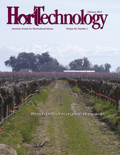
HORTTECHNOLOGY
Exploring groundbreaking insights in horticultural science.HORTTECHNOLOGY is a premier open-access journal published by the American Society for Horticultural Science, focusing on innovative research and advancements in the field of horticulture. With an ISSN of 1063-0198 and an E-ISSN of 1943-7714, this esteemed journal has been disseminating valuable information since 1993 and continues to be a key resource with a convergence period extending to 2024. HORTTECHNOLOGY holds a reputable position in the academic community, classified in the Q2 quartile for horticulture, reflecting its significance and quality within the discipline. Its current Scopus rank places it at 49 out of 115 within Agricultural and Biological Sciences - Horticulture, positioning it in the 57th percentile. Researchers, professionals, and students alike benefit from the accessible research findings this journal offers, addressing critical challenges and advancing knowledge in horticultural practices. HORTTECHNOLOGY is committed to fostering scientific progress and open dialogue within the horticultural community, making it an invaluable resource for anyone passionate about the field.

MITTEILUNGEN KLOSTERNEUBURG
Fostering Collaboration for a Greener FutureMITTEILUNGEN KLOSTERNEUBURG is a prestigious journal published by the Höhere Bundeslehranstalt & Bundesamt für Wein- und Obstbau Klosterneuburg in Austria, focusing on the fields of horticulture and agricultural sciences. With an ISSN of 0007-5922, this journal disseminates vital research findings and advancements within the horticultural sector, emphasizing sustainable practices and innovative techniques in wine and fruit cultivation. It has been recognized for its scholarly contributions, achieving a Q3 ranking in horticulture as of 2023, positioning it among the notable resources in its field. While currently not offering open access options, MITTEILUNGEN KLOSTERNEUBURG remains an essential platform for researchers, professionals, and students alike, fostering knowledge exchange and collaborative advancements in horticultural science. The journal's dedication to supporting research from 1989 through 2024 highlights its longstanding commitment to excellence in the industry.

AMERICAN JOURNAL OF POTATO RESEARCH
Pioneering Insights for Potato Cultivation and ManagementAMERICAN JOURNAL OF POTATO RESEARCH is a prominent scholarly journal dedicated to the field of potato research, encompassing vital areas of Agronomy and Crop Science. Published by SPRINGER, this journal holds an impactful presence in the scientific community, as evidenced by its placement in the Q2 quartile of both Agronomy and Plant Science categories for 2023. With a Scopus rank of #145 out of 406 in Agricultural and Biological Sciences, it offers a significant platform for researchers, professionals, and students alike. Covering diverse topics from cultivation techniques to pest management, the journal aims to advance understanding and innovation in potato science, facilitating the sharing of cutting-edge research and fostering collaboration among scholars. Accessible to a global audience, the journal encourages the dissemination of knowledge through its open-access options. Since its inception in 1998, the AMERICAN JOURNAL OF POTATO RESEARCH has been committed to contributing valuable insights that drive the industry forward and support sustainable agricultural practices.
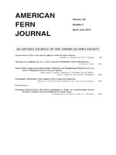
AMERICAN FERN JOURNAL
Connecting Researchers to the World of FernsAMERICAN FERN JOURNAL, published by AMER FERN SOC INC, is a pivotal resource for researchers and enthusiasts in the fields of Ecology, Evolution, Behavior, and Plant Science. With a publication history dating back to 1993 and extending through 2024, this journal serves as a critical platform for the dissemination of knowledge related to ferns and lycophytes, contributing significantly to taxonomic and ecological studies. While it currently holds a Q4 rank in Ecology, Evolution, Behavior and Systematics and a Q3 rank in Plant Science, the journal continually strives to improve its relevance and impact within the scientific community. Researchers can access its valuable content through conventional subscription models, providing curated articles that advance the understanding of fern biodiversity and conservation. This journal is essential for anyone devoted to the exploration and preservation of these vital plant groups, offering insights that are not only relevant to academic circles but also inspire the broader public to appreciate the beauty and importance of ferns in our ecosystems.
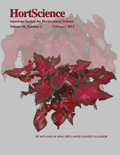
HORTSCIENCE
Exploring the forefront of horticultural research.HORTSCIENCE is a prestigious journal published by the American Society for Horticultural Science, focusing on the latest research and developments in the field of horticulture. With an ISSN of 0018-5345 and an E-ISSN of 2327-9834, this journal has established itself as a vital resource for horticultural scientists, practitioners, and educators since its inception. As of 2020, it has embraced an Open Access model, promoting the dissemination of scientific knowledge and enabling wider accessibility to its rich content. HORTSCIENCE currently holds a Q2 ranking in the Horticulture category for 2023, placing it in the top tier of its field with a Scopus rank of 36 out of 115 in the area of Agricultural and Biological Sciences. This journal publishes empirical research, significant advancements, and comprehensive reviews that contribute to the understanding and improvement of horticultural practices, making it an essential publication for anyone involved in horticultural research or education.

Horticulture Environment and Biotechnology
Cultivating Innovations in Horticulture and BiotechnologyHorticulture Environment and Biotechnology is a prestigious journal published by the Korean Society of Horticultural Science, dedicated to advancing knowledge in the fields of horticulture, biotechnology, and plant science. Since its inception in 2011, this journal has played a crucial role in disseminating high-quality research, evidenced by its 2023 category quartile rankings, which position it in Q1 for Horticulture and Q2 for Biotechnology and Plant Science. With impressive Scopus rankings, including Rank #18 out of 115 in Horticulture, the journal continues to demonstrate its significance within the academic community by contributing to innovative practices and findings that impact both environmental sustainability and horticultural advancements. Currently, the journal is accessible to a global audience, facilitating the exchange of ideas and research outcomes with no open-access fees. Horticulture Environment and Biotechnology strives to support researchers, professionals, and students alike by providing a platform for critical discussions on the intersection of horticultural science and biotechnology, thereby fostering the development of sustainable agricultural practices that align with contemporary challenges.
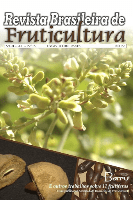
Revista Brasileira de Fruticultura
Cultivating Knowledge, Harvesting InnovationRevista Brasileira de Fruticultura, published by the Sociedade Brasileira de Fruticultura, is a leading scholarly journal dedicated to the advancement of research in the fields of agronomy, crop science, food science, horticulture, and plant science. With an impressive Open Access model adopted since 2001, the journal is committed to disseminating high-quality research from Brazil and beyond, promoting innovation and collaboration among researchers, professionals, and students alike. The journal currently holds a respectable Q3 category ranking in multiple fields as of 2023, reflecting its significance within the scientific community, specifically ranked #72 in horticulture and #257 in agronomy, among its peers. The Revista Brasileira de Fruticultura not only serves as a platform for original research articles, reviews, and case studies but also emphasizes practical applications and sustainable practices in fruit cultivation. Its aim is to enhance the visibility of Brazilian fruit research on a global scale, making it an invaluable resource for those invested in advancing horticultural sciences.

Erwerbs-Obstbau
Exploring the Depths of Fruit Cultivation.Erwerbs-Obstbau is a pivotal journal dedicated to the field of horticulture, focusing on research concerning the cultivation and production of fruit. Published by Springer in Germany, this journal plays a crucial role in disseminating innovative findings and advancing the knowledge base within the agricultural and biological sciences landscape. With an impact factor that places it in the Q3 category of horticultural journals, it ranks #68 out of 115 in its field according to Scopus, demonstrating its relevance and contribution to ongoing debates and advancements in horticulture practices. Researchers, professionals, and students benefit from the insights and developments shared in its pages, as the journal has been successfully converging data and insights since its inception in 1983, including continuous contributions from 1996 to the present. Although the journal currently does not offer Open Access, its comprehensive articles are invaluable for anyone invested in the science of fruit cultivation and production.
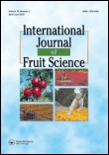
International Journal of Fruit Science
Elevating research standards in plant science.International Journal of Fruit Science, published by TAYLOR & FRANCIS INC, is a preeminent platform for the dissemination of high-quality research in the fields of Agronomy, Horticulture, Ecology, and Plant Science. With an impressive track record since its inception in 2005 and ongoing convergence up to 2024, this journal serves as a vital resource for scholars and industry professionals alike. Renowned for its rigorous peer-review process and comprehensive publication of cutting-edge studies, it holds a distinguished position in multiple Scopus rankings, including a top 10 placement in Horticulture (Rank #8/115) and notable percentiles, reflecting its significant impact in the academic community. Researchers can delve into critical insights related to fruit cultivation, genetics, and sustainability, bolstered by its Q1 and Q2 quartile standings across various categories. Though the journal is not open access, it remains an essential read for those intent on advancing knowledge and practices within the rapidly evolving landscape of fruit science.
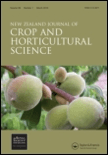
NEW ZEALAND JOURNAL OF CROP AND HORTICULTURAL SCIENCE
Advancing Agricultural Insights for a Sustainable FutureThe New Zealand Journal of Crop and Horticultural Science, published by Taylor & Francis Ltd, stands as a key resource in the fields of Agronomy and Horticulture, with a commendable impact factor reflecting its quality and influence in the scientific community. Since its inception in 1989, this journal has been committed to advancing our understanding of crop development and horticultural practices, catering not only to researchers and professionals but also to students eager to delve into the intricacies of plant sciences. With a Q3 ranking in both Agronomy and Crop Science and Horticulture as of 2023, the journal occupies a significant position within the agricultural and biological sciences domain, significantly contributing to the body of knowledge in these fields. The journal features original research, reviews, and technical notes that cover a wide range of topics, ensuring a comprehensive perspective on contemporary and emerging agricultural issues. For individuals interested in accessing cutting-edge research, the journal provides subscription-based access, further enhancing its scholarly contributions.